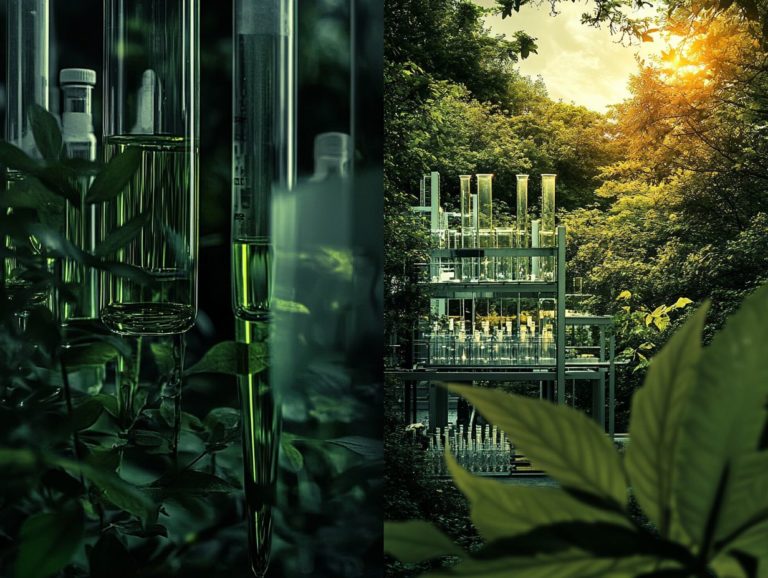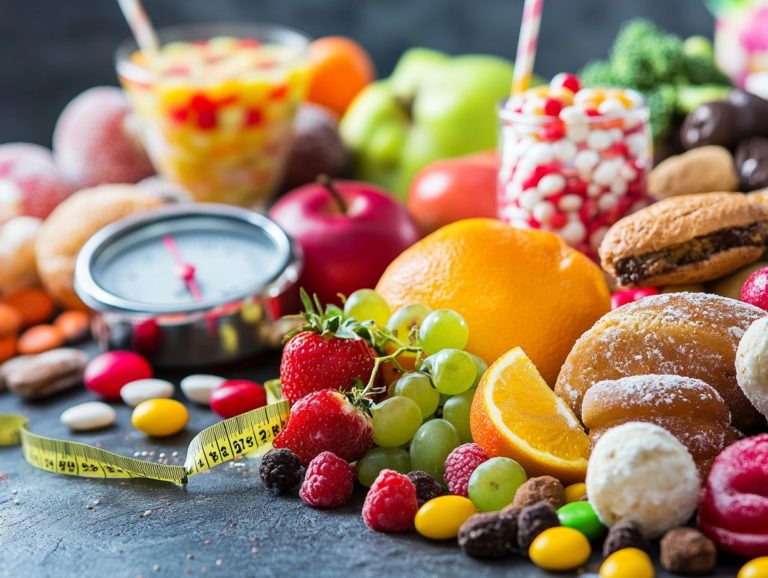Hydration Myths: How Much Water Do You Really Need?
Staying properly hydrated is essential for your overall health, yet many people are often misinformed about their fluid needs. This article delves into common hydration myths, offering clarity on just how much water you truly require based on factors like your lifestyle and activity level.
You’ll explore the signs that indicate you re adequately hydrated, the serious consequences of dehydration on both health and performance, and practical tips to maintain optimal hydration daily.
Dive in to uncover the truth about hydration and how it can elevate your well-being!
Contents
- Key Takeaways:
- Common Hydration Myths
- How Much Water Do You Really Need?
- Signs of Proper Hydration
- Consequences of Dehydration
- Tips for Staying Hydrated
- Frequently Asked Questions
- Is it true that drinking 8 glasses of water a day is necessary for proper hydration?
- Can you get enough hydration from sources other than water?
- Does drinking more water help with weight loss?
- Are sports drinks necessary for rehydration during exercise?
- Is it possible to drink too much water?
- Can caffeinated beverages like coffee and tea dehydrate you?
Key Takeaways:
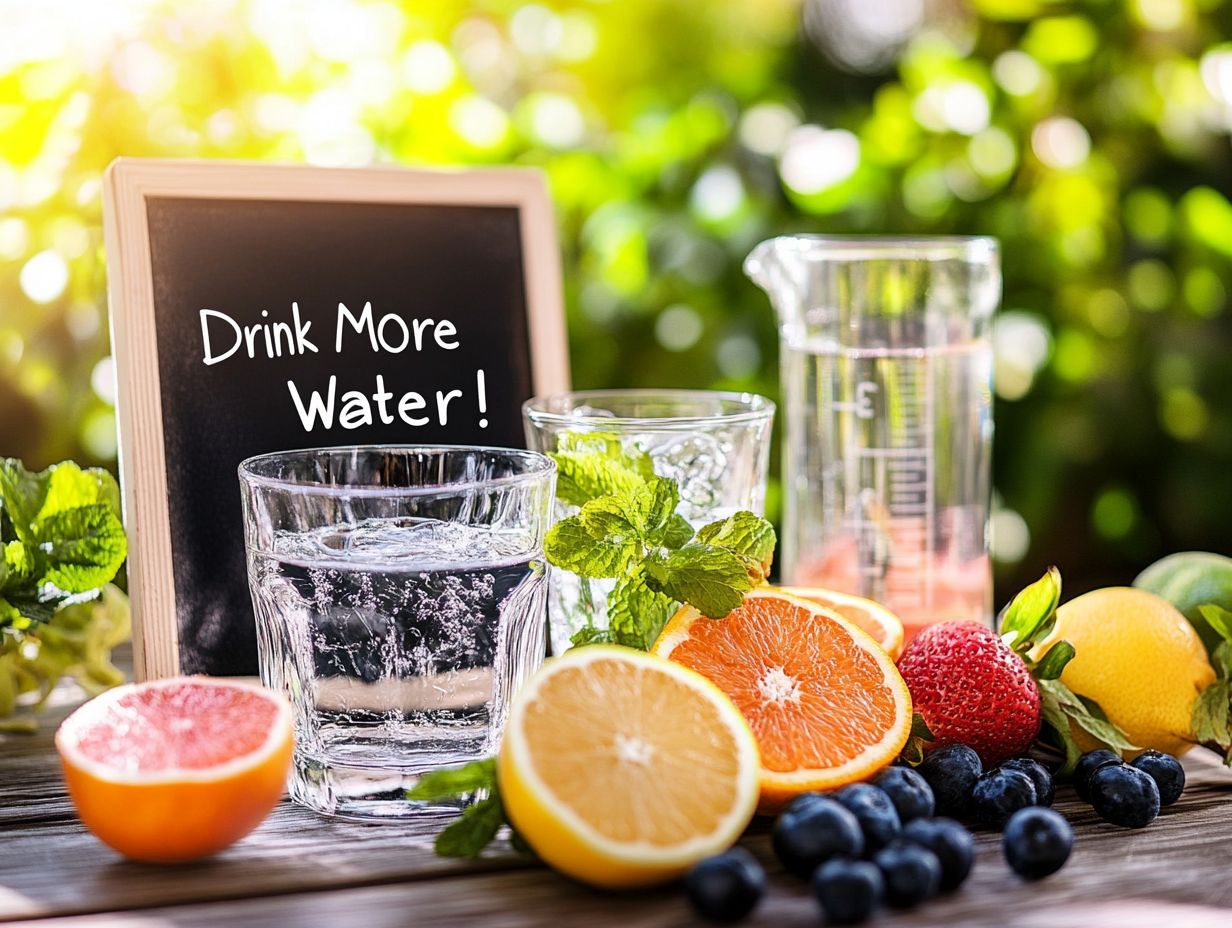
Debunking common misconceptions is crucial for understanding proper hydration needs. Factors such as age, activity level, and climate can affect your daily water intake needs. Physical and mental indicators, such as clear urine and improved concentration, can signal proper hydration levels.
Common Hydration Myths
Common hydration myths can easily mislead you about your daily water needs, hydration strategies, and the overall significance of maintaining proper hydration levels for optimal health.
Contrary to popular belief, the notion that everyone should drink eight glasses of water daily doesn’t fit all; your hydration needs can vary significantly based on factors such as age, climate, and physical activity levels.
Grasping the science behind hydration is essential for dispelling these myths and empowering you to make informed beverage choices.
Debunking Common Misconceptions
Debunking common misconceptions about hydration is crucial for ensuring you understand your true fluid intake needs and the risks that come with dehydration.
Take the belief that caffeinated beverages, like coffee or tea, significantly contribute to dehydration; that s a myth. While these drinks do contain caffeine, their diuretic effect is usually quite mild and doesn’t outweigh their hydrating benefits.
Don’t mistake thirst for adequate hydration. Your body may need water even when you don’t feel thirsty.
Misunderstanding these hydration myths can lead to serious health risks, including chronic dehydration, which can negatively impact your overall wellness.
How Much Water Do You Really Need?
Determining how much water you truly need each day hinges on several factors, including your body weight, physical activity levels, climate conditions, and individual health considerations.
While general guidelines often recommend about eight glasses of water daily, your hydration needs can vary significantly due to age, environmental influences, and your specific activity levels. This makes it essential for you to evaluate your unique requirements and tailor your intake accordingly.
Factors that Affect Water Intake Needs
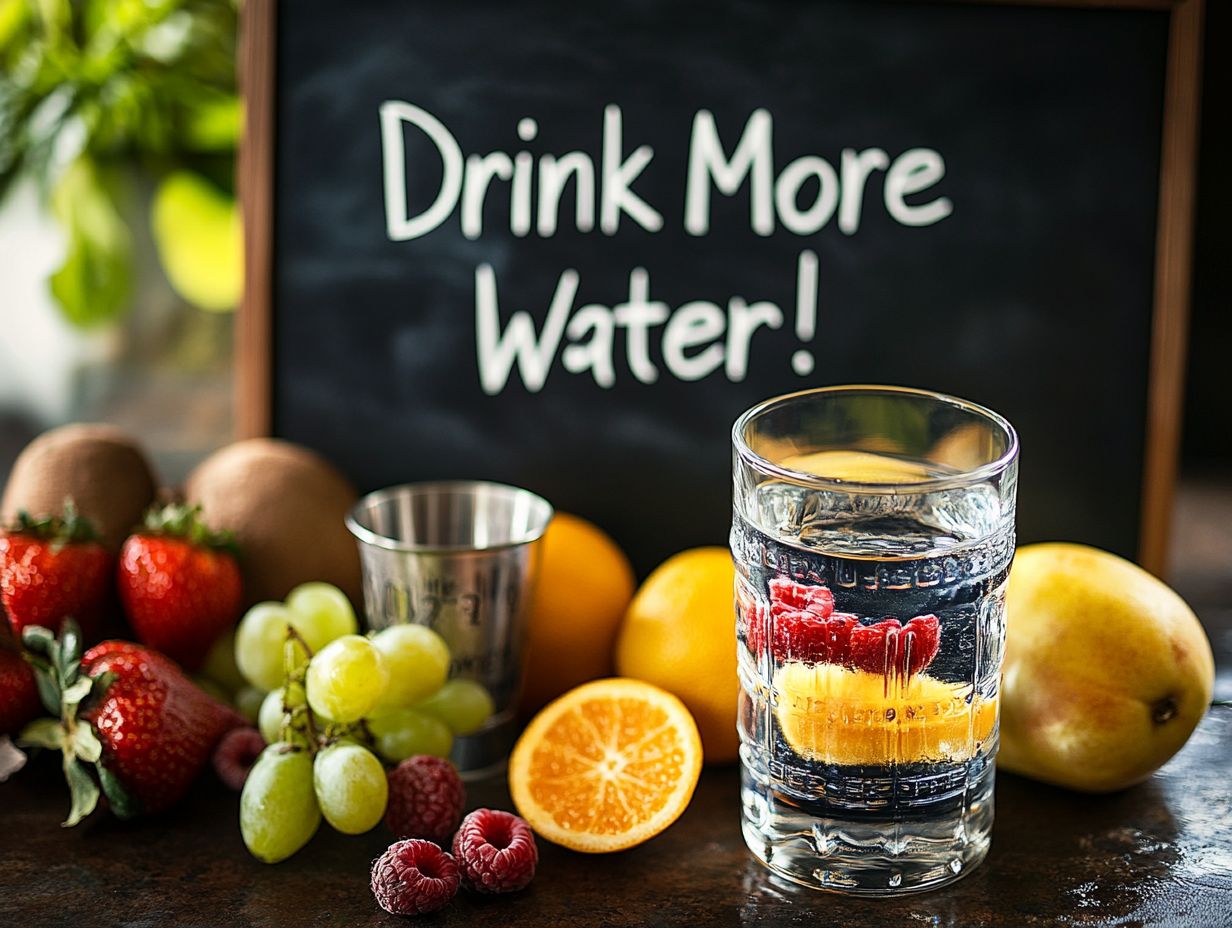
Several key factors significantly influence your water intake needs and the risk of dehydration, including physical activity, climate conditions, and age.
If you find yourself in a hotter climate, you may notice that you lose fluids more quickly through sweating. This means it’s crucial for you to step up your hydration game to maintain optimal levels.
Engaging in intense physical activities raises your thirst. It also increases your need for essential minerals to replenish those that your body has lost.
As people age, their sense of thirst often decreases. Older adults often experience a decrease in kidney function, making it trickier to stay properly hydrated.
Understanding these factors is crucial. Dehydration can sneak up on you, so stay informed and act quickly!
Signs of Proper Hydration
Recognizing the signs of proper hydration is essential for maintaining your optimal health and well-being, ensuring that your body operates at its peak.
Indicators like clear or light-colored urine, consistent energy levels, and a well-regulated thirst reflex are telltale signs of effective hydration. Ignoring these vital signals from your body can lead to a range of health risks and complications that you want to avoid.
Physical and Mental Indicators
Physical and mental indicators of hydration are essential for understanding your body s needs and ensuring optimal performance throughout the day.
Take the color of your urine, for instance. It acts as a quick gauge for your hydration levels. A light yellow hue typically indicates that you’re well-hydrated, whereas darker shades signal a pressing need for increased fluid intake.
Mental clarity is just as crucial. If you feel foggy or sluggish, it may mean your body isn’t getting enough water. This link between hydration and how well you think and make decisions emphasizes the importance of the thirst mechanism, which alerts you when it’s time to replenish your fluids.
By maintaining good hydration habits, you support your bodily functions and enhance your mood and vitality, significantly contributing to your overall health and well-being.
Consequences of Dehydration
The consequences of dehydration can be quite severe, impacting your physical performance and overall health.
Chronic dehydration may lead to significant health risks, such as impaired kidney function, urinary tract infections, and a noticeable decline in how well you think and make decisions.
This underscores the importance of recognizing and prioritizing effective hydration in your daily routine.
Health Risks and Performance Impact
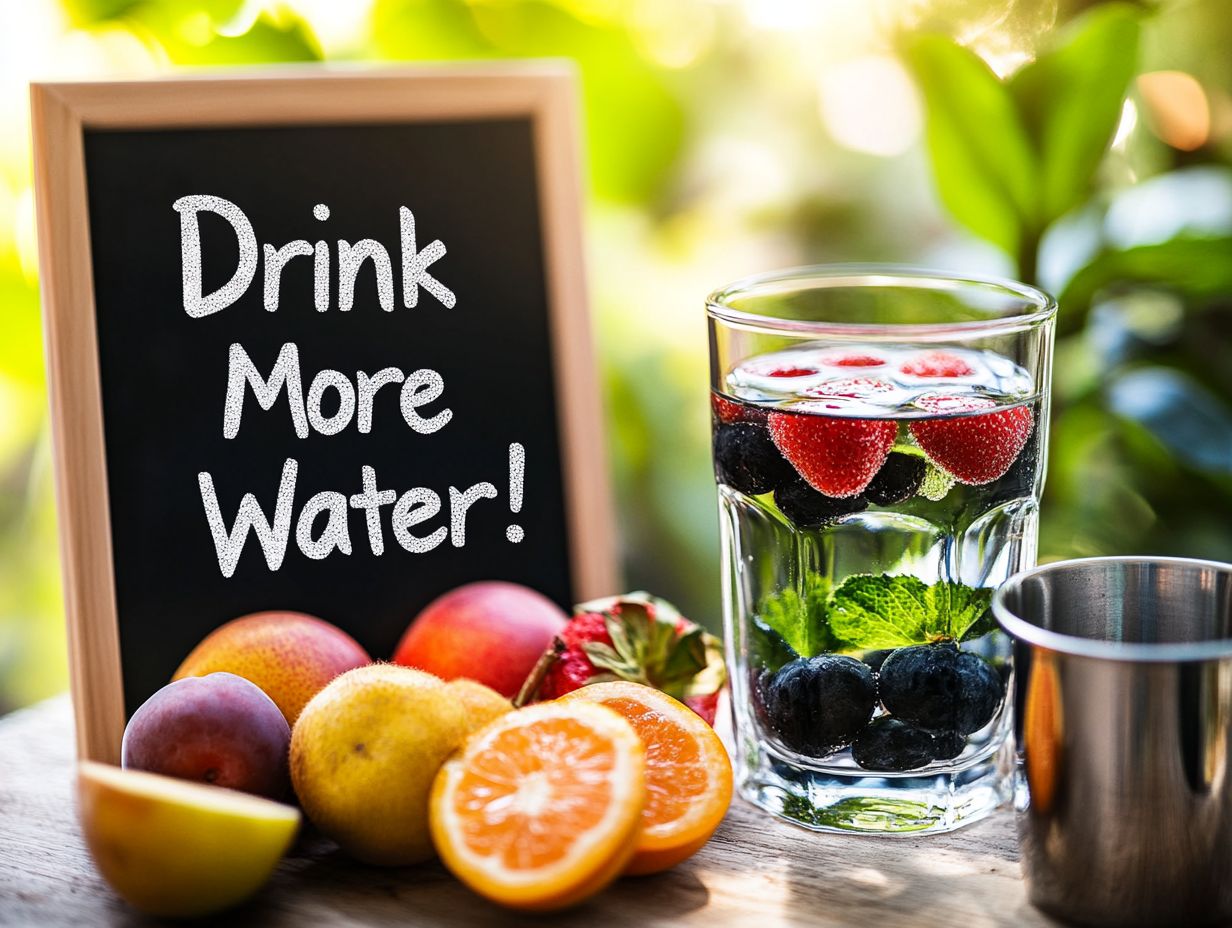
Understanding the health risks and performance ramifications of dehydration is crucial for anyone striving to maintain optimal physical and mental function. Dehydration can lead to serious health complications, particularly impairing kidney function, hindering your body’s ability to eliminate waste effectively.
You ll notice diminished exercise performance as your hydration levels drop, with your body struggling to maintain stamina and strength during physical activity. Prioritizing hydration is essential, whether you’re an athlete or a casual exerciser, to stave off fatigue and muscle cramps.
Maintaining adequate hydration daily can significantly enhance your cognitive abilities, leading to improved focus and sharper decision-making. This highlights the importance of consistent fluid intake in various scenarios at work, during workouts, or at home.
Tips for Staying Hydrated
Implementing effective tips for staying hydrated can greatly enhance your health, allowing you to meet your daily fluid requirements effortlessly.
By choosing the right beverages and incorporating water-rich foods into your diet, you can support optimal hydration and enjoy its myriad benefits.
Practical Strategies for Maintaining Proper Hydration
Adopting practical strategies for maintaining proper hydration is essential for your health, especially if you engage in physical activity. Key approaches include ensuring regular fluid intake throughout the day, monitoring your urine color, and using hydration techniques tailored to your needs.
To enhance your hydration routine, set reminders on your devices to prompt timely water consumption. This makes it easier to establish a consistent habit.
Incorporate hydrating foods like cucumbers, watermelon, and oranges into your diet to significantly boost your overall fluid intake.
Track your daily fluid consumption with an app or a simple log to ensure you meet your hydration goals. This mindfulness allows you to adjust your intake as needed, particularly on active days when fluid loss tends to increase.
Frequently Asked Questions
Is it true that drinking 8 glasses of water a day is necessary for proper hydration?
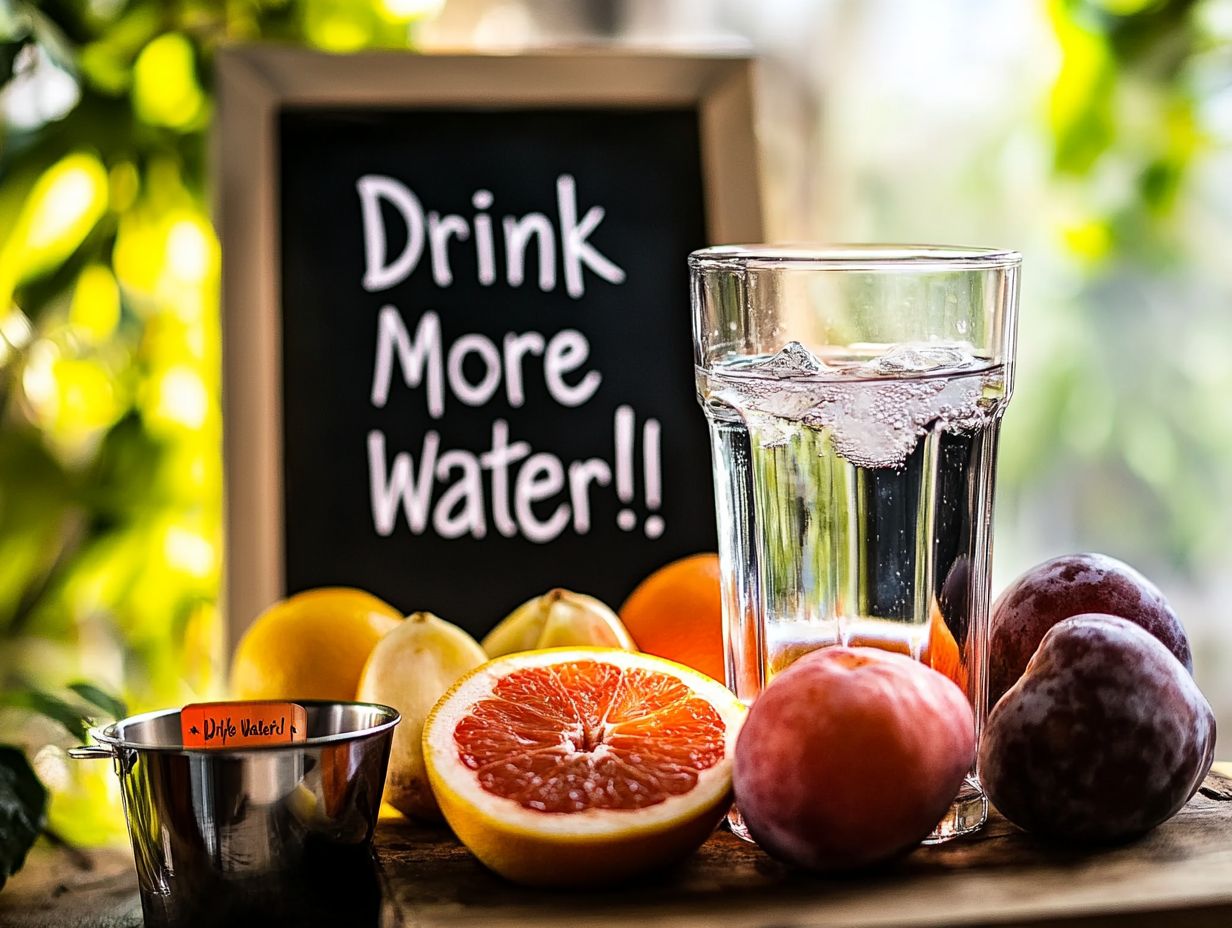
This is a common misconception and not entirely accurate. While drinking 8 glasses of water a day is a good goal, the amount of water you need depends on various factors such as activity level, climate, and overall health.
Can you get enough hydration from sources other than water?
Yes, water found in foods like fruits and vegetables, as well as beverages like tea and juice, can contribute to your daily hydration needs. However, water remains the best and most efficient source of hydration for the body.
Take Action: Start prioritizing your hydration today! Make a conscious effort to drink more water and incorporate hydrating foods into your meals.
Does drinking more water help with weight loss?
Drinking water can help with weight loss. It fills you up and reduces calorie intake, but it’s not a magic solution.
Proper hydration is important for overall health. However, it’s just one factor for achieving and maintaining a healthy weight.
Are sports drinks necessary for rehydration during exercise?
In most cases, water is enough for rehydration during exercise. Sports drinks are useful for intense and prolonged physical activity.
But for the average person, water is the best choice to stay hydrated.
Is it possible to drink too much water?
Yes, you can drink too much water. This can lead to a condition called hyponatremia.
Hyponatremia occurs when your body’s sodium levels become diluted. Symptoms include headaches, confusion, and nausea.
It’s essential to listen to your body’s thirst cues. Drink water only when you feel thirsty.
Can caffeinated beverages like coffee and tea dehydrate you?
Caffeine is a mild diuretic, which means it can increase urine production. However, the caffeine in coffee or tea isn’t enough to significantly dehydrate you.
These beverages still contribute to your daily hydration needs. Balance them with water for optimal hydration.

